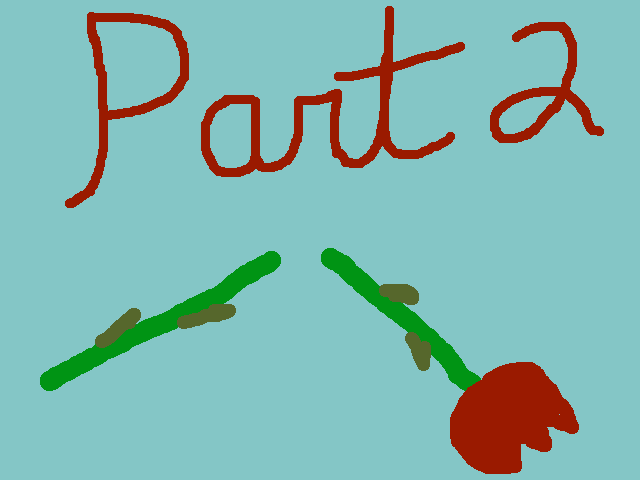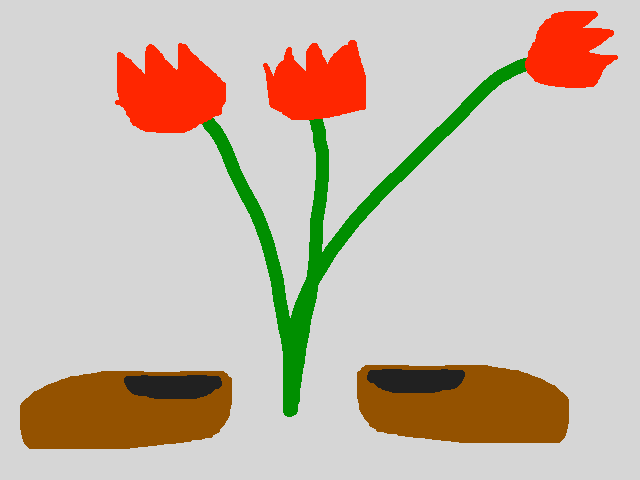Seeking to impress my girlfriend by breaking with my deliberative ways (don’t say indecisive), I hit the buy button within a single month of discovering MHP Massage’s Berkeley Split Saddle Massage Chair. It’s a chair made not for receiving massages but for administering them, and at $200 it was priced well below the competition. As the name suggests, the seat is shaped somewhat like a horse saddle, but split down the middle, to avoid pressuring the perineum (known in medical circles as “the gooch”).
The box arrived several days later. I assembled the chair in minutes and then gleefully scooted myself around our study’s hardwood floor on the unexpectedly smooth casters. The seat raised and lowered easily, and I noted how strong and upright I felt. It was equally comfortable at standard sitting height or raised up so that I could straddle it from a half-standing position at my standing desk. I sent a video hyping it to my friends and tried to imagine what my life would look like in my new era of quintupled productivity and perfect Gokhalean spinal alignment.
And for the first few days, it was great. My posture really was better, I felt more alert and stable; sitting was more active and less muscle-liquefying. But I couldn’t blind myself to it forever: My right nut went numb whenever I sat on it. Numbness of that sort is the result of compression of the perineal nerve, the very thing I was trying to avoid with the split saddle. In denial, I tried to find other explanations. Was it my pants? I switched to athletic shorts. No improvement. Perhaps if I arranged…things just so before sitting…Again, no dice.
But dreams die hard, and I wasn’t going to let a small wrinkle like that get in between me and perfect posture. I paraded our apartment’s collection of pillows and cushions over to the chair and sought some combination that would maintain the chair’s posture-enhancing properties while eliminating the unfortunate numbness. None of them worked—they were all too lumpy, or slid around too much, or just made the numbness worse. It was time to face the music: I didn’t own the right pillow. So I went online and ordered a donut pillow of the sort used by those with hemorrhoids. With hands trembling with fear and hope, I placed it on top of my saddle chair and sat down on it. Did it slip? It didn’t slip. Did I go numb? I didn’t go numb. Was there another problem with it? Of course there was. The added height made the backrest misaligned with my back, and I ended up slouching worse than in any other office chair. Defeated, I began the process of returning the chair.
MHP Massage sold the chair both through Amazon and its own website, and when ordering, I opted to order directly from them to support their business. But while Amazon featured free returns if unused (which I considered the chair to essentially be), MHP charged a 20% restocking fee, and I would have to pay for return shipping. Schemers and scammers! I thought. I emailed them explaining my reason for ordering from them and asking them to honor the return policy on Amazon. Elaine wrote back and said that I would have to pay for the return shipping, but they would waive the restocking fee if the chair was unused. The game was on.
I checked UPS, USPS, and Fedex, and none would ship the chair back to Sacramento for less than $90. At nearly half of the price of the chair, this wasn’t going to cut it. I emailed Elaine asking her if MHP would send me a shipping label and deduct it from my return (she had earlier told me that their shipping cost was $40). She agreed.
Now I had to convince them that the chair was unused to prevent them robbing me of another $40. The first step in their malicious plan was to make the chair fiendishly hard to take apart. After half an hour of struggling and watching their YouTube video, I managed to get the seat off of the seat post. That was the easy part. The other end of the seat post was jammed into a ring at the center of the chair base, with the tip of the post sticking out just below the bottom of the chair base with the casters removed. No amount of yanking and swearing would dislodge it. I balanced the post on a piece of wood and jumped on the base; this just sent me falling sideways. I laid a piece of wood over the base and hammered away at it. The post didn’t slip a millimeter. I turned the whole thing upside down and suspended it in the cavity of my washing machine and repeated the wood-and-hammer trick, this time on the bottom of the seat post itself. Again, not a millimeter.
It was at this point that I stopped to consider the neoliberal homo economicus view of the situation: rather than struggle for who knew how much longer to take this chair apart in order to return it, shouldn’t I just work a few more hours, earn the amount I was going to get refunded, and wash my hands of the whole thing? Maybe, but I didn’t particularly want to do work work on my Saturday, and besides, it would feel like a defeat to, after all that, email MHP to say that I wouldn’t be returning the chair after all and then post it for free on Craigslist because I couldn’t take it apart.
So I resumed my efforts. Some YouTube videos showed success with the obvious combination of WD-40 and a rubber mallet, so I trudged down to Ace to buy them. I sprayed the WD-40 onto the post and once more hung the assembly over my washing machine to bang on it with the mallet. This time, it slipped out.
Everything was disassembled, and now I just had to make sure all the parts were clean and get them into their original packaging to complete my restocking fee coup. As you may have guessed by the general trend of these efforts, this was easier said than done. WD-40 had run into all the crevices of the chair base, and just when I thought I had gotten it all, I would feel another run of cold grease and have to bring out the rag again. The white-accented casters had accumulated a surprising amount of dust and hair in the week that I had used the chair, and I meticulously wiped each one of them down. I wiped down the fabric of the chair and cleaned the smudged fingerprints off all the metal.
But it was the seat post that, even this far in, threatened to blow up the whole operation. The post was slightly extended and wouldn’t fit back in the box it came in. I tried to compress it by hand, but my arms were no match for the hydraulic cylinder inside. I grabbed the piece of wood I had been hammering on, balanced it on top of the post, and sat on it. I glided smoothly down, and, feeling satisfied with myself, slid the post into the box. It was still too long! I tried it again. Same result. I realized that when I tilted off of the seat post, there was still enough pressure on the button on top to give the hydraulic assembly movement but not enough weight to keep it compressed, and in that moment it was expanding. I tried it once more, this time placing the post upside down with the button on the slab of wood. It held.
As I pulled the foam sleeves over the chair parts, the sleeves ripping and splitting and me not being able to do anything about it, I felt that solid sense of earnedness that comes with accomplishing anything physical. But I also noticed that I cared much less than I did before if I got the restocking fee waived or not. While I had before cast it as a punitive measure, something the assholes who sold me the chair were tacking on to get some money out of my return, going through the process of cleaning it up to make it like new again made me appreciate just how much work it took. The chair was only so cheap to begin with because the cost of the return processing labor wasn’t baked into the price, and it now struck me as a completely reasonable fee to charge.
A week later, I got an email from Paypal. MHP had refunded me the whole amount. I wrote Elaine to say thank you.
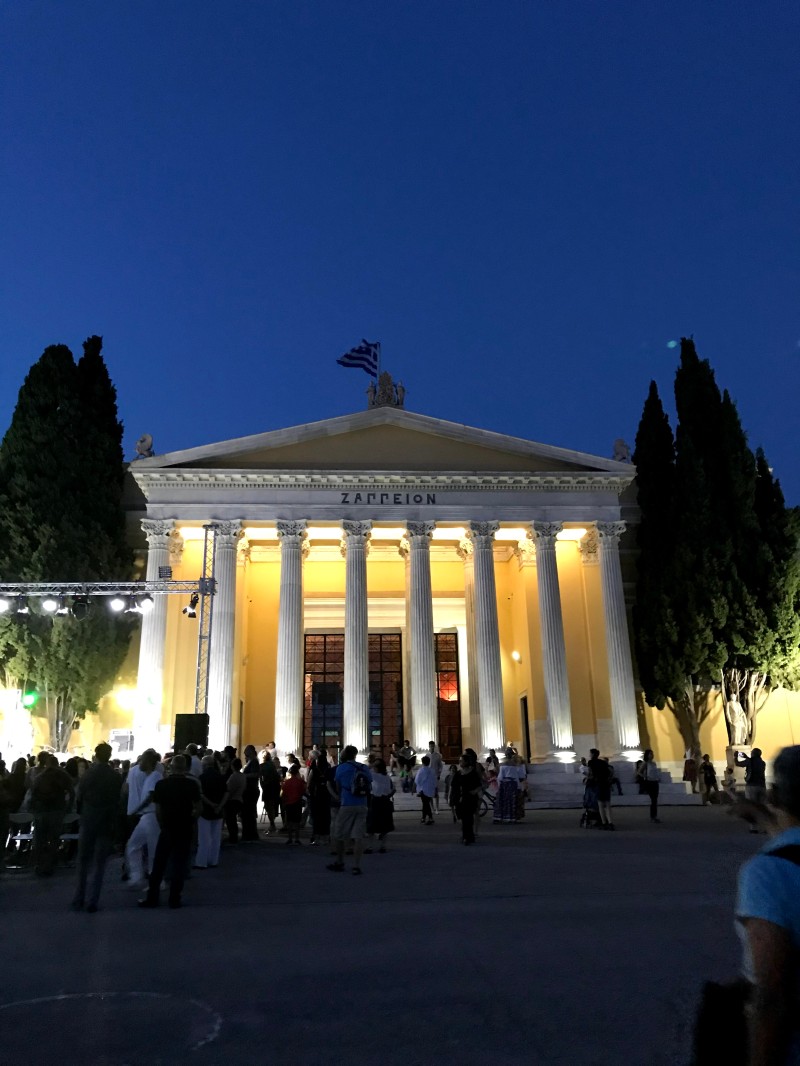
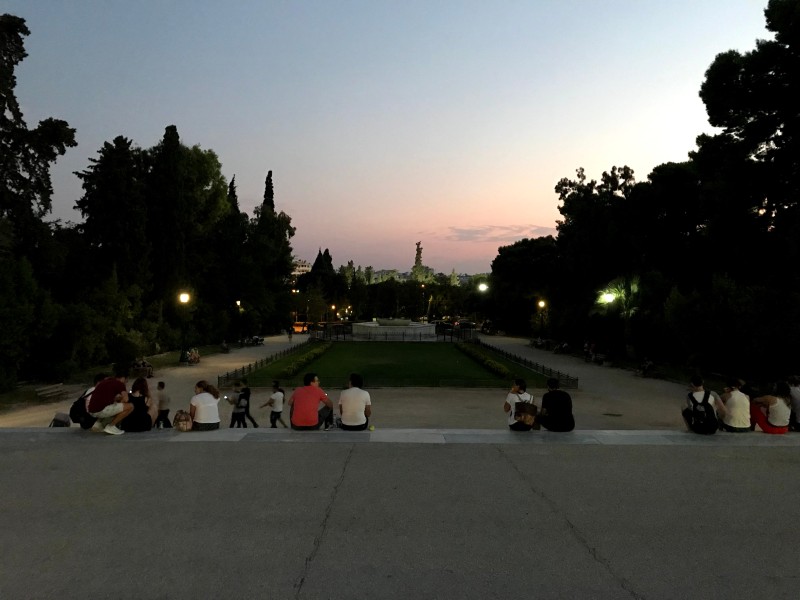
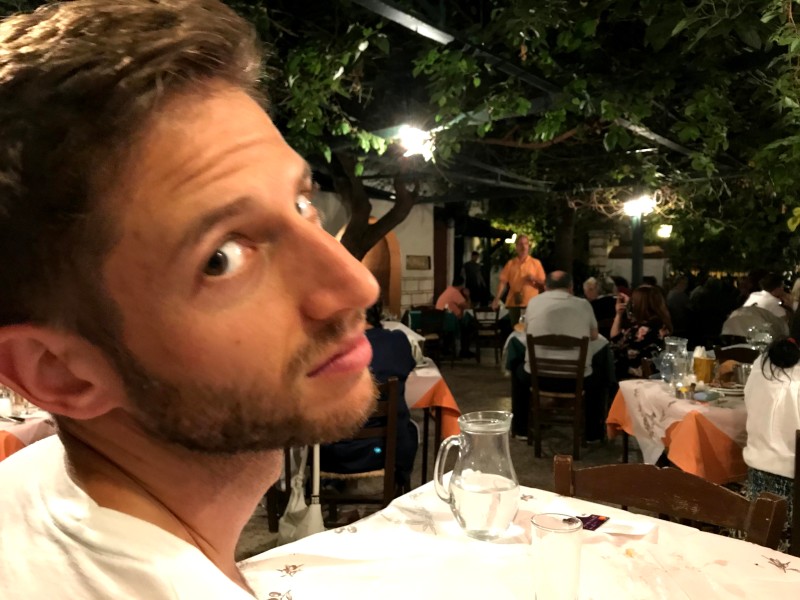
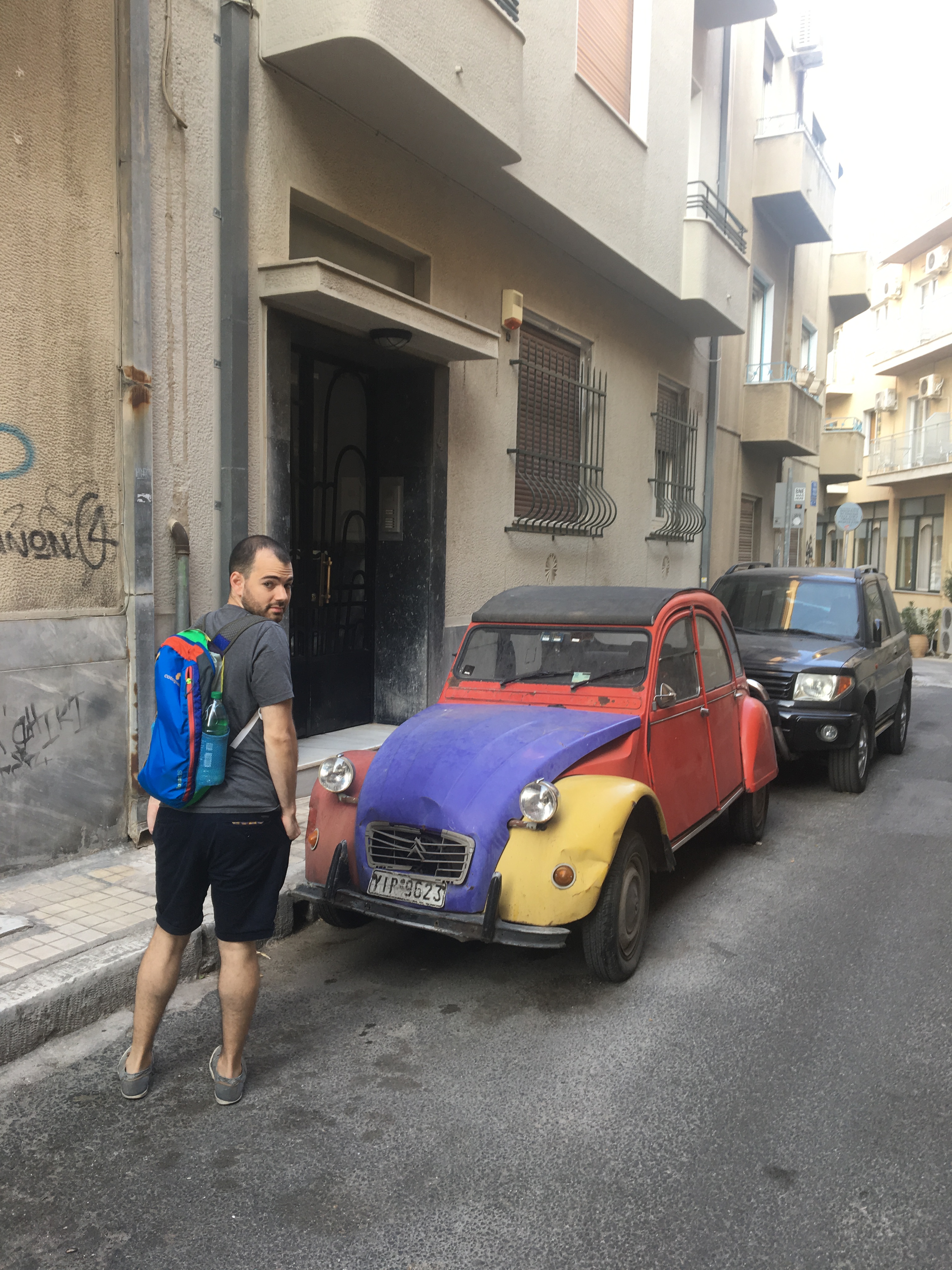
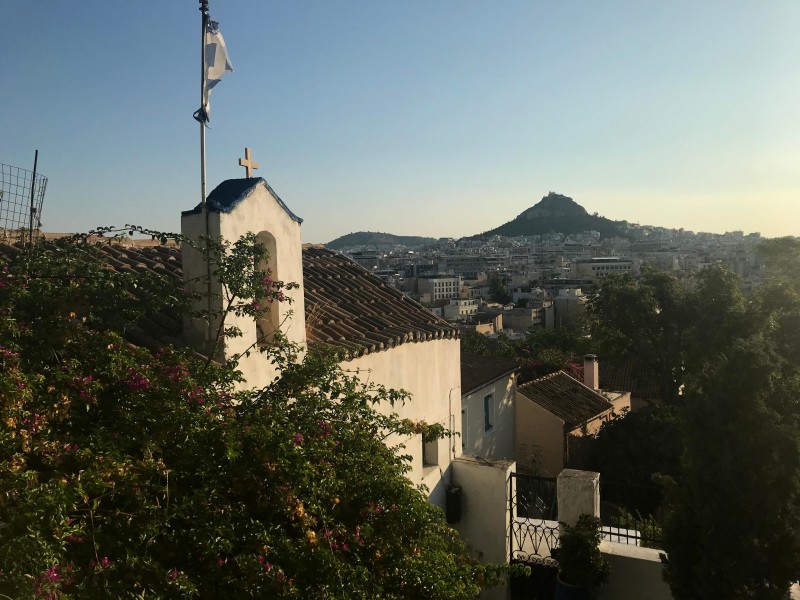 The path took us up to the wrought-iron fencing bearing warnings of surveillance cameras that protected the vertically towering stone walls of the fort that served as the lodestar for our wanderings. We followed the fence for a ways and finally came to a sign indicating that this mysterious structure was in fact the Akropolis. We hadn’t been able to see what was on top of it from our vantage point. Perhaps it should have been obvious but I liked the adventure of not knowing and not consulting a map to tell us.
The path took us up to the wrought-iron fencing bearing warnings of surveillance cameras that protected the vertically towering stone walls of the fort that served as the lodestar for our wanderings. We followed the fence for a ways and finally came to a sign indicating that this mysterious structure was in fact the Akropolis. We hadn’t been able to see what was on top of it from our vantage point. Perhaps it should have been obvious but I liked the adventure of not knowing and not consulting a map to tell us.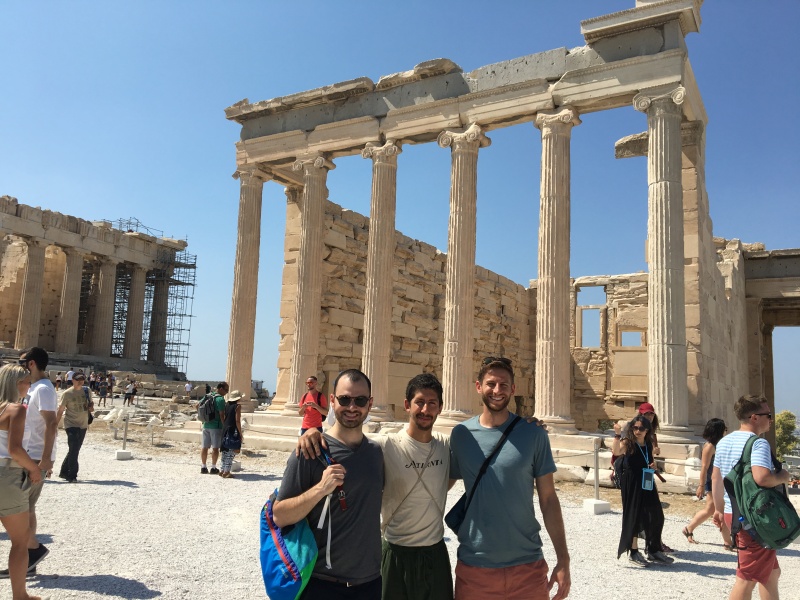
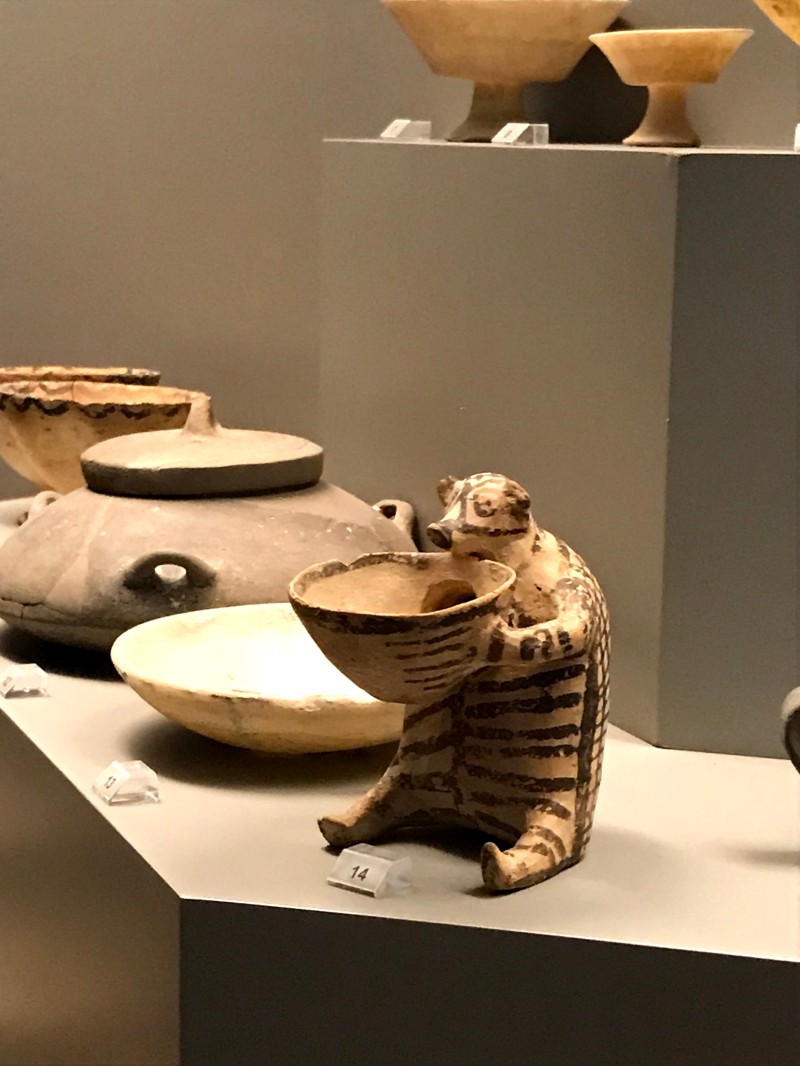 There were two exhibits that I most enjoyed; one was a temporary installation drawings some choice pieces from the different galleries into a contemplation on the nature of beauty and its interpretations across the thousands of years of Greek history, tracing the depiction of the human form in its art from generic archetypes to stoic and noble renderings of mythological men and finally, the exhibit’s culmination, to the anonymous bronze head that carries woven into its strong features all the thoughts and worries and mental chatter of a man living in time and in space that happened to be 1st Century BC Delos but could just as easily have been the one from which I’m writing this or the one in which you’re now reading it.
There were two exhibits that I most enjoyed; one was a temporary installation drawings some choice pieces from the different galleries into a contemplation on the nature of beauty and its interpretations across the thousands of years of Greek history, tracing the depiction of the human form in its art from generic archetypes to stoic and noble renderings of mythological men and finally, the exhibit’s culmination, to the anonymous bronze head that carries woven into its strong features all the thoughts and worries and mental chatter of a man living in time and in space that happened to be 1st Century BC Delos but could just as easily have been the one from which I’m writing this or the one in which you’re now reading it.




